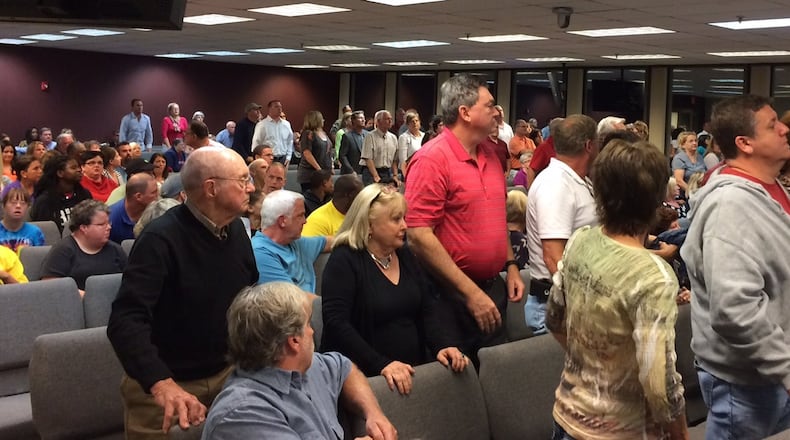Elizabeth Baker and her neighbors didn’t appreciate being likened to Nazis. Or small-town Georgia racists circa 1950.
Baker was fuming Thursday night after the Hall County commission meeting at which the board approved a planned community for adults with developmental disabilities. It wasn’t the facility getting OK’d that made her so mad. It was the way it was approved, she said, with the board seemingly in agreement before the vote and residents who were in opposition castigated as bigots.
After the meeting, Baker confronted Krista Dowling Goodrich, who had advocated passionately for the project before the commission and who made the aspersions. Goodrich, whose family is developing the project, said she was responding to an online campaign against the facility.
This rezoning vote was a typical exercise in local politics: someone proposes to build something. People see a change is coming. Conjecture builds. Worry ensues. Folks pack a room.
But what happened here demonstrates a new wrinkle in this age-old process. Here, the Internet aided public engagement, which is good, but enabled people to create a narrative, often ugly and untrue, that built upon itself. The petition against the plan drew comments with the usual zoning buzzwords like “traffic” and “density.” But then, terms like “mentally challenged” and “Section 8 deadbeats” and “near a school” came in and the controversy took on a life of its own.
As Goodrich told me afterwards, “It’s real easy to say nasty things behind a computer.”
The project is a good idea; even a lot of opponents think so. The plan: build a small village on 21 acres for 158 people with disabilities like autism, head injuries or Down syndrome and help them lead independent, rewarding lives.
Who could be against that?
Nobody, unless it’s getting built next to you. The plan for the “Just” People facility near Flowery Branch filled a large meeting room last week with residents, most of them in opposition, leaving Hall County commissioners to weigh a Good Idea versus the Will of the People. This time the Good Idea beat the Will in a 4-1 vote. Put another way, the People lost. They’re certainly saying that.
‘A right to make my voice heard’
The planned development sits near three subdivisions and an elementary school and is down the road from the Atlanta Falcons’ practice facility.
Loretta Hodge-Morales, a real estate agent who lives nearby, started the petition to get the word out that the facility’s location was a bad idea.
“I have a right as a citizen to make my voice heard,” she said. “We were trying to reach as many neighbors as we could in a short period of time.”
And then the “Just” People folks set up their petition to counter the accusations.
The “anti-” site had 34 pages of comments, including:
One resident at the planning commission meeting a couple weeks earlier brought up the granddaddy of fears — a potential school shooting.
Co-existing with neighbors in Roswell?
Hearing the rising voice of fear in the community, the Dowling family, who started the Just People organization 20 years ago, fought back with their own public relations offensive. Krista Dowling Goodrich started the second petition and the family held a barbecue on the site to answer neighbors’s questions.
The village wouldn’t be Section 8 housing, they argued, a point that many opponents seemed to miss. They also argued that people with developmental disabilities are far more often victim than victimizer.
The Dowlings run similar facilities in Lilburn and Roswell, taking care of about 160 live-in residents and another 120 living off-site. Many hold jobs as grocery baggers, restaurant workers and the like.
Roswell’s Mayor Jere Wood said the facility there, which sits between homes and commercial buildings, has not drawn complaints from neighbors.
But he’s not surprised by the objections.
“Neighborhoods object to parks in their neighborhoods; they object to houses the same size as their own in their neighborhood,” said Wood, who came to politics “as one of those local troublemakers.”
The windup to Thursday’s meeting in Hall County became more emotional as it approached.
Kelli Salyer, who is “Just” People’s VP and the daughter of the organization’s founder, said opponents were posting the Dowling family’s home addresses online.
Hodge-Morales said someone from the Dowling camp contacted her employer to paint her as a bigot.
‘They’d act like it didn’t happen’
At the meeting, the opponents were organized and polite in their presentations, often starting out by praising the project and then recounting their own personal connection with disabled people. Then they spoke about flooding, traffic and property values, not mentally challenged people living in Section 8.
Dowling Goodrich then began her presentation, calling out her opponents. She came across to many, even some commissioners, as a bit over-the-top, especially compared to the other side’s speakers.
But, she said, it was a counterstrike against the opponents’ Internet petition. She insists she didn’t call the neighbors Nazis; she just said that some employed similar tactics once used to dehumanize others.
“I knew once they got to the public forum (the opponents) they’d act like that didn’t happen,” she said. “But that’s unfair. It happened.”
Elizabeth Butler thinks the claims of discrimination might have cowed some commissioners into voting for the project.
Regardless, the complex is now slated to be built and new neighbors are coming.
The Latest
Featured


